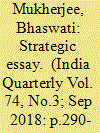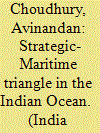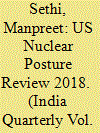| Srl | Item |
| 1 |
ID:
160796


|
|
|
|
|
| Summary/Abstract |
The defence industrial cooperation is a clear missing link in an otherwise expanding strategic relationship between India and the US. The one-way defence trade is not only out of sync with India’s traditional demand for technology transfer and license production from its arms suppliers, but is also contrary to Make in India initiative of the Indian government. It is, therefore, imperative for New Delhi in particular to find an industrial solution to its increasing yet skewed defence trade relationship with the Washington. Besides demanding industrial benefits from all possible defence deals with the US in the future, New Delhi has to do a few more things to deepen the industry-to-industry cooperation with the US. Among others, it has to use its defence offset policy carefully to facilitate greater military-specific technology transfers for its industry; and at the same time lay a strong foundation for a robust in-house industrial base which can receive and absorb all such transfers.
|
|
|
|
|
|
|
|
|
|
|
|
|
|
|
|
| 2 |
ID:
160793


|
|
|
|
|
| Summary/Abstract |
The emerging dynamics between President Trump, NATO and EU promises to constitute a fascinating new narrative of the changing contours of the international order in this millennium. President Trump has completely reversed American policy towards NATO.
As a businessman, Trump has made it clear that henceforth US funding and support would be linked to the US getting a ‘good deal’ from its NATO partners. NATO had earlier anchored itself to the benchmark goal that 2% of a country’s GDP should go to defence spending.
|
|
|
|
|
|
|
|
|
|
|
|
|
|
|
|
| 3 |
ID:
160794


|
|
|
|
|
| Summary/Abstract |
The increasing Chinese naval presence in and around Indian ocean, coupled with the rise of the home-grown Indian Navy and the US naval dominance over the global commons, has brought about a strategic maritime triangle in the Indian Ocean. This article looks into the evolving role, capacity and objectives of the Indian, Chinese and US Navy vis-à-vis their strategic interests in the Indian Ocean region. The article argues that the ascendency of China’s naval prowess in Indian Ocean will prod India to opt for a tactical naval entente with the USA. Few impediments to the potential formation of a close-knit Indo-US partnership like India’s fear of losing strategic autonomy, its aversion in being an east Asian naval power, US–Pakistan ties and the difference in the Indian and USA’s interpretation of the concept of ‘Freedom of Navigation’ have been discussed. The article contends that an effective Indo-US naval cooperation will depend on how these impediments are taken into considerations within the make-up of their partnership.
|
|
|
|
|
|
|
|
|
|
|
|
|
|
|
|
| 4 |
ID:
160791


|
|
|
|
|
| Summary/Abstract |
The Western realists and Western liberalists evaluate the universal interdependence and globalisation from distinct political and theoretical standpoints. This article critically examines Western realism and Western liberalism—the two genetic theoretical streams that comprise a converse version of the globalisation of world politics. It exemplifies the effects, the impacts, the benefits and the challenges of globalisation from different angles—not from a particular aspect. In addition, it attempts to critically explicate the role of the Trump administration in order to understand this regime’s motive towards globalisation.
|
|
|
|
|
|
|
|
|
|
|
|
|
|
|
|
| 5 |
ID:
160792


|
|
|
|
|
| Summary/Abstract |
The first year and half of Trump’s presidency has demonstrated a visible departure from the Obama’s policy in West Asia. While the basic premise of the two administrations of protecting American national interest remains, their methods are significantly different. Obama wanted to move away while Trump has retrenched the USA in regional affairs. While Trump is being accused of taking rash decisions and pushing the region into further chaos, Obama’s hands-off policy did not prevent the regional turmoil either. The common chord between Obama’s legacy and Trump’s policies in West Asia is that the USA is losing ground to emerging global powers, such as Russia and China despite remaining the predominant security guarantor.
|
|
|
|
|
|
|
|
|
|
|
|
|
|
|
|
| 6 |
ID:
160795


|
|
|
|
|
| Summary/Abstract |
The latest NPR released in 2018 under the watch of President Trump, unabashedly echoes the sentiment of America First. Many nuclear war-fighting issues and concepts that had been settled in the past after having been experimented with and discarded for the risks they carried have yet again been adopted by the current NPR. But, America’s sole focus on its own security alone could end up creating more security dilemmas for the US, and others. This article identifies the main highlights of the NPR, as well as its limitations, and the implications of both for nuclear strategies of major nuclear players. It describes and analyses the context, the content and the consequences of the NPR. It specifically flags some issues/actions that India must particularly watch out for since some of these need to be monitored for their implications on the nuclear strategies and trajectories of India’s nuclear armed neighbours.
|
|
|
|
|
|
|
|
|
|
|
|
|
|
|
|